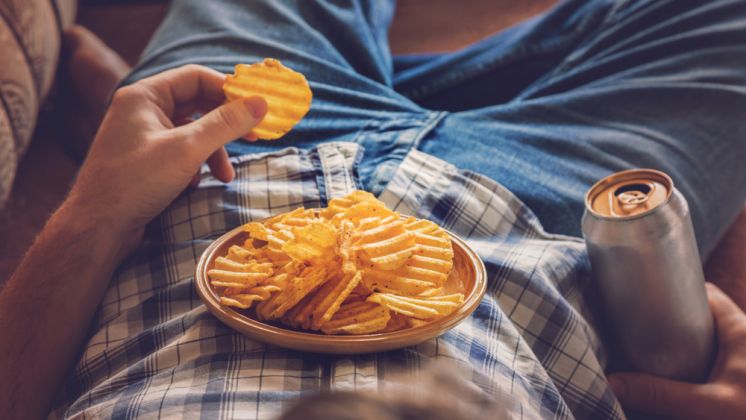What Is Emotional Eating And How Do You Tackle It?
Are you eating even when no hunger pangs have pinged? It could be emotional eating

Sign up for workout ideas, training advice, reviews of the latest gear and more.
You are now subscribed
Your newsletter sign-up was successful
Eating is an entirely natural and correct reaction to being hungry, but it’s fair to say that most of us don’t restrict our eating to when we’re genuinely in need of some calories. We snack in the evenings while watching TV, graze at our desk throughout the working day, and regularly find space for a second dinner after a few drinks.
For many people, eating can also be a response to how they are feeling. We spoke to Tracey Strudwick, nutritional therapist at Nuffield Health, about the causes of emotional eating and how people can deal with it.
What is emotional eating?
Emotional eating is eating in response to mostly negative feelings or situations, rather than eating to satisfy physical hunger.
Is emotional eating a common problem for men?
Research now suggests both sexes struggle with binge eating. According to the Binge Eating Disorder Association, 40% of the estimated ten million Americans who binge eat are men.
In a study of 46,351 men and women aged 18 to 65 published in the International Journal Of Eating Disorders, roughly 11% of women and 7.5% of men struggled with binge eating.
What are some common causes of emotional eating?
When stress is chronic it leads to high levels of the hormone cortisol. Studies show that elevated cortisol may alter the brain’s response to food in ways that predispose the individual to poor eating habits such as craving sweet, salty and high-fat foods.
Boredom is another common cause, as is social influences. Eating with a social group encourages overeating, especially where alcohol is involved because alcohol lowers willpower and influences food choices. Although this is generally connected with feelings of happiness, it’s still emotional eating. Also, social situations may be difficult for some people and lead to feelings of anxiety.
Sign up for workout ideas, training advice, reviews of the latest gear and more.
See related
- How to Stop Loving Fries (and Reboot Your Relationship with Food)
- Mindful Eating Explained
- How To Use Positive Thinking To Manage Stress
How do you spot that you’ve succumbed to emotional eating?
Emotional hunger comes on suddenly and feels like it needs to be satisfied instantly, while physical hunger comes on gradually and can wait. You will often crave specific comfort foods, whereas physical hunger can be satisfied with a wider variety of foods. Emotional hunger also doesn’t stop when you are physically full. You may have feelings of guilt, powerlessness and shame.
Ask yourself these questions – answering yes to any of them could be a sign of emotional eating:
- Do you eat when you’re not hungry?
- Do you eat to feel better when you’re sad, anxious or bored?
- Do you reward yourself with food?
- Do you regularly eat until you feel completely stuffed?
What are some ways you can tackle emotional eating?
First, try to identify your triggers. Keep a food and mood diary. And before you give in to the “food want”, wait for five minutes. Often if it’s an emotional need, the craving will subside.
Find alternative ways to manage negative thoughts – take some exercise, preferably outdoors, or call a friend, or read an uplifting book.
Give yourself non-food rewards like a massage or tickets to a sporting event or concert. Practise healthy habits: exercise daily, make time for relaxation – yoga, meditation, breathing techniques – and spend time with people who enhance your life.

Nick Harris-Fry is a journalist who has been covering health and fitness since 2015. Nick is an avid runner, covering 70-110km a week, which gives him ample opportunity to test a wide range of running shoes and running gear. He is also the chief tester for fitness trackers and running watches, treadmills and exercise bikes, and workout headphones.
